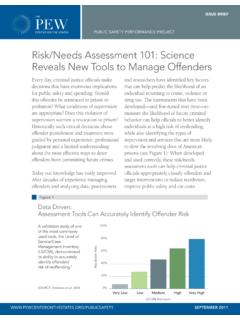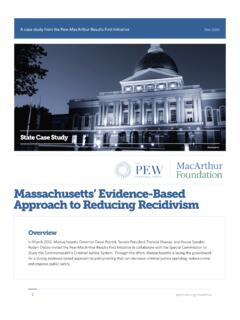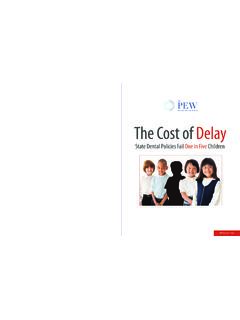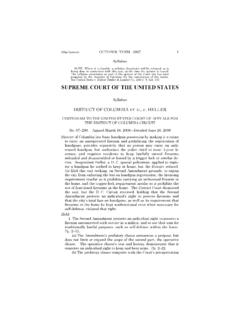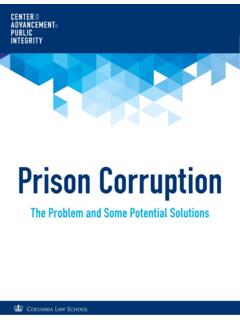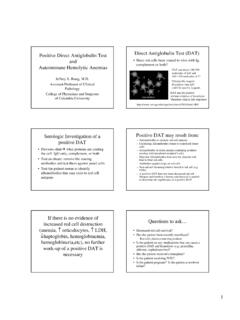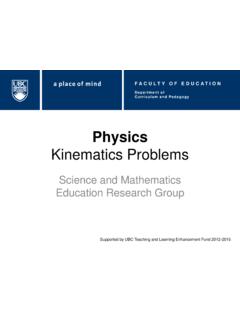Transcription of Breaking the Plastic Wave - Home | The Pew Charitable Trusts
1 Breakingthe PlasticWaveThought PartnersA COMPREHENSIVE ASSESSMENT OF PATHWAYS TOWARDS STOPPING OCEAN Plastic POLLUTIONFULL REPORT 3A Comprehensive Assessment of Pathways Towards Stopping Ocean Plastic PollutionPREFACE 4 EXPERT PANEL 5 ENDORSEMENTS 6 EXECUTIVE SUMMARY: TEN CRITICAL FINDINGS 8 FAST FACTS: Breaking THE Plastic WAVE IN NUMBERS 14 INTRODUCTION: Plastic , THE OCEAN, AND THE GLOBAL DEBATE 16 Ocean Plastic pollution: Challenges and opportunities in a complex system 17 About this project: A global stochastic model 18 CHAPTER 1. AN UNTENABLE TRAJECTORY THE IMPERATIVE TO ADDRESS THE OCEAN Plastic POLLUTION CRISIS 24 Super growth: Business-as-Usual will have nearly three times more Plastic leaking into the ocean in 2040 25 Falling short: Current commitments are inadequate for the scale of the challenge 30No panacea: Single-solution strategies cannot stop Plastic pollution 31 CHAPTER 2.
2 CHANGING THE SYSTEM A STRATEGY TO REDUCE OCEAN Plastic POLLUTION RATES BY 80 PER CENT 37A viable pathway: An integrated circular strategy can offer better economic, environmental, and social outcomes 39A workable agenda: Eight synergistic system interventions can break the cycle of ocean Plastic pollution 47 Macroplastic system interventions 48 Microplastic system interventions 89 Maritime sources of leakage 96 CHAPTER 3.
3 BRIDGING THE GAP INNOVATION IS ESSENTIAL FOR A FUTURE WITH NEAR-ZERO Plastic POLLUTION 99 Alternative worlds: Sensitivities and design choices for pollution reduction strategies 100 The innovation gap: Near-zero leakage requires significant innovation 101 CHAPTER 4. THE TIME IS NOW SUCCESS REQUIRES ALL PLAYERS TO TAKE RAPID AND CONCERTED ACTION 104A substantial transition: Investments in the new system are significant, but returns are attractive 105 From theory to action: Unprecedented and resolute action from all stakeholders is required to stop Plastic pollution 106 Regional priorities: Applying different solutions for different geographies 114 The cost of waiting: Delaying implementation of the system interventions from 2020 to 2025 would add 80 million metric tons more Plastic to the ocean 116 CONCLUSION 119 APPENDIX A.
4 KEY ASSUMPTIONS AND DATA SOURCES 120 APPENDIX B: SYSTEM MAPS 129 GLOSSARY 137 ENDNOTES 140 ACKNOWLEDGEMENTS
5 150 THOUGHT PARTNERS 152 Table of contents Cover: Willyam Bradberry/ShutterstockAbout The Pew Charitable TrustsThe Pew Charitable Trusts is driven by the power of knowledge to solve today s most challenging problems. Pew applies a rigorous, analytical approach to improve public policy, inform the public, and invigorate civic life. As the United States and the world have evolved, we have remained dedicated to our founders emphasis on innovation. Today, Pew is a global research and public policy organization, still operated as an independent, nonpartisan, nonprofit organization dedicated to serving the by the founders interest in research, practical knowledge, and public service, our portfolio includes public opinion research; arts and culture; civic initiatives; and environmental, health, state, and consumer policy initiatives.
6 Our goal is to make a difference for the public. That means working on a few key issues, with an emphasis on projects that can produce consequential outcomes, foster new ideas, attract partners, avoid partisanship or wishful thinking, and achieve measurable results that serve the public more at more information, contact us at SYSTEMIQSYSTEMIQ Ltd. is a certified B Corp with offices in London, Munich, and Jakarta. The company was founded in 2016 to drive the achievements of the Paris Agreement and the United Nations Sustainable Development Goals by transforming markets and business models in three key economic systems: land use, materials, and energy. Since 2016, SYSTEMIQ has been involved in several system change initiatives related to plastics and packaging, including the New plastics Economy initiative (Ellen MacArthur Foundation) and Project STOP (a city partnership programme focused on eliminating Plastic pollution in Indonesia), among others.
7 At the heart of our work is the core belief that only a smart combination of policy, technology, funding, and consumer engagement can address system-level challenges. The global plastics challenge is no more at more information, contact us at 54 Breaking THE Plastic WAVEA Comprehensive Assessment of Pathways Towards Stopping Ocean Plastic Pollution Preface This work was developed in partnership with an expert panel representing all relevant disciplines and geographies: Expert panel Richard BaileyProfessor ofEnvironmental SystemsUniversity of Oxford Mao DaExecutive directorShenzhen Zero WasteJutta Gutberlet ProfessorUniversity of VictoriaEllie MossSenior adviserEncourage CapitalCostas VelisLecturerUniversity of LeedsJulien BoucherCo-founderQuantis and ShapingEnvironmental ActionEnzo FavoinoResearcherScuola Agraria del Parco di MonzaEdward KosiorManaging directorNextekDaniella RussoCo-founder and CEOT hink Beyond PlasticJill BoughtonFounderWaste2 Worth InnovationsMalati GadgilIndependent consultantInformal sector waste managementCrispian LaoFounding presidentPhilippine Alliance for Recycling and MaterialSustainabilityUssif Rashid SumailaProfessorUniversity of BritishColumbia Arturo CastilloResearch fellow Imperial College LondonLinda Godfrey
8 Principal researcherCouncil for Scientificand Industrial ResearchDaniela LerarioTriciclos Brazil Richard Thompson ProfessorUniversity of PlymouthIn recent years, an increasing number of studies and reports have advanced the global understanding of the challenge posed by ocean Plastic pollution. But most leaders across industry, government, and civil society have noted a critical gap: an evidence-based roadmap to describe the pathways available and to foster convergent action. As a step towards building that roadmap, The Pew Charitable Trusts partnered with SYSTEMIQ to build on previous research and create this first-of-its-kind model of the global plastics system, with results suggesting that there is an evidence-based, comprehensive, integrated, and economically attractive pathway to greatly reduce Plastic pollution entering our ocean.
9 The findings of our analysis were published in the peer-reviewed journal, Science on 23 July speed at which ocean Plastic pollution has climbed up the public agenda has been surprising. Yet, even as the world starts to comprehend the enormity of the challenge, major actors disagree on the solution. In preparing Breaking the Plastic Wave: A Comprehensive Assessment of Pathways Towards Stopping Ocean Plastic Pollution, we consulted an extensive group of stakeholders from academia, industry, government, and nongovernmental organizations, who without exception shared the concern and demonstrated willingness to act but often offered contradictory solutions. We then developed perhaps the most comprehensive Plastic system modelling tool to create a global analysis that evaluates various strategies to reduce ocean Plastic flows and quantifies the associated economic, environmental, and social implications of each pathway.
10 The ultimate aim of this work is to help guide policymakers, industry executives, investors, and civil society leaders through highly contested, often data-poor, and complex terrain. Our analysis includes several key findings that could help define changes to the global system that are necessary to stop Plastic pollution from flowing into the ocean. The research supporting this report involved 17 experts from across the spectrum of people looking at the Plastic pollution problem and with broad geographical representation, and was undertaken by our two independent organizations in collaboration with four partner institutions the University of Oxford, University of Leeds, Ellen MacArthur Foundation, and Common Seas. In addition, the project team drew upon major publications, analyses, and reports, and consulted more than 100 independent experts, to develop and populate the model.
